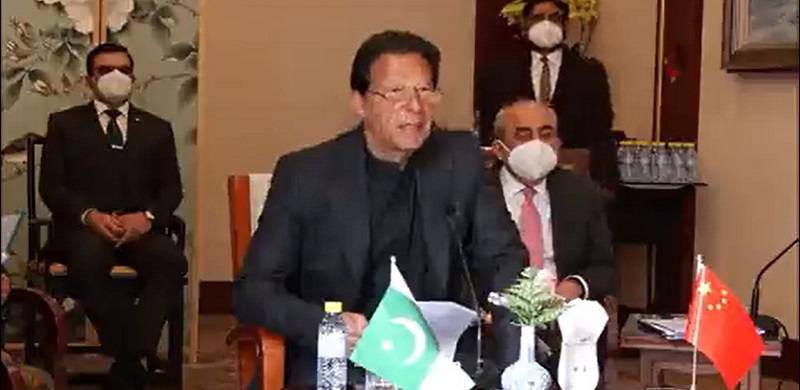
During his four-day visit to China, Prime Minister Imran Khan has highlighted the threat posed by India's Bharatiya Janata Party (BJP) and its Hindutva ideology, which he said was causing instability in the region.
The PM discussed India, Kashmir, CPEC and various other regional matters with academics and representatives of various Chinese think tanks, universities, as well as the Pakistan Study Centre in Beijing.
"The atrocities of India are continuing in Indian-Occupied Kashmir (IOK). The world should pay attention to the ongoing atrocities of India against Kashmiris,” the premier remarked, thanking China for their support.
In regards to the China-Pakistan Economic Corridor (CPEC), he explained that the next phase of the project would prioritize industrialization, cooperation in information technology, and agricultural transformation. CPEC is an integral part of President Xi Jinping's Belt and Road Initiative (BRI), which aims to increase trade and ultimately develop an 'expanded, interdependent market.'
“In view of myriad global challenges, the world did not need another Cold War. Divisions could result in mounting sufferings and prevent common benefits. Pakistan was, therefore, of the belief that the key driver in international politics should be cooperation, rather than confrontation,” he said.
The prime minister flagged Pakistan as a more favourable investment destination than many other countries along the BRI, also offering better incentives for Chinese investment.
He called for greater cooperation between the two countries to improve humanitarian and security conditions in Afghanistan, and said that the two countries were well positioned to advance 'peace, development and connectivity' to the war torn country.
The PM discussed India, Kashmir, CPEC and various other regional matters with academics and representatives of various Chinese think tanks, universities, as well as the Pakistan Study Centre in Beijing.
"The atrocities of India are continuing in Indian-Occupied Kashmir (IOK). The world should pay attention to the ongoing atrocities of India against Kashmiris,” the premier remarked, thanking China for their support.
In regards to the China-Pakistan Economic Corridor (CPEC), he explained that the next phase of the project would prioritize industrialization, cooperation in information technology, and agricultural transformation. CPEC is an integral part of President Xi Jinping's Belt and Road Initiative (BRI), which aims to increase trade and ultimately develop an 'expanded, interdependent market.'
“In view of myriad global challenges, the world did not need another Cold War. Divisions could result in mounting sufferings and prevent common benefits. Pakistan was, therefore, of the belief that the key driver in international politics should be cooperation, rather than confrontation,” he said.
The prime minister flagged Pakistan as a more favourable investment destination than many other countries along the BRI, also offering better incentives for Chinese investment.
He called for greater cooperation between the two countries to improve humanitarian and security conditions in Afghanistan, and said that the two countries were well positioned to advance 'peace, development and connectivity' to the war torn country.

